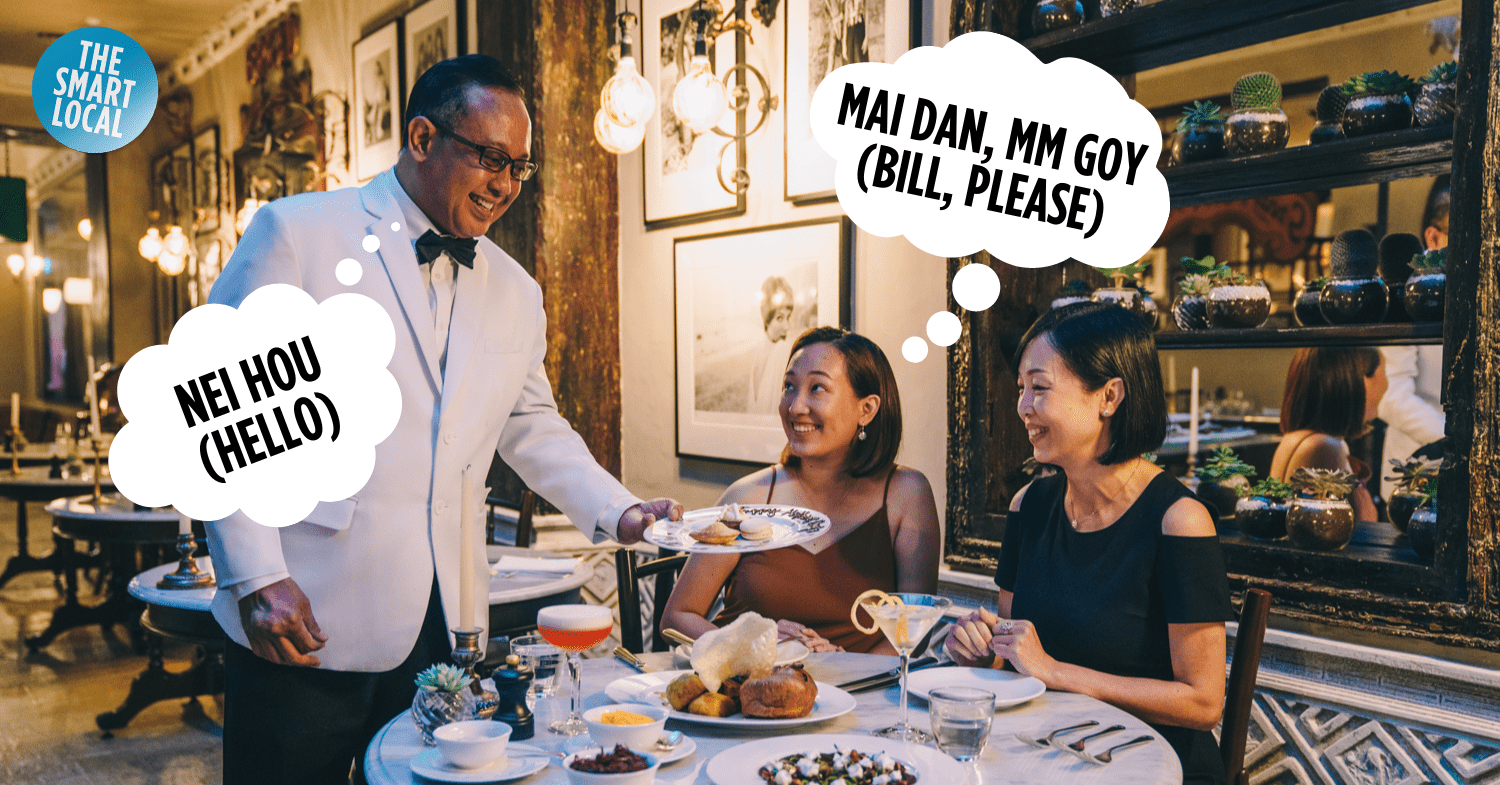Cantonese phrases for travellers to Hong Kong & Macau
While Hong Kong and Macau are popular destinations for Singaporeans, understanding and conversing in Cantonese can be a challenge when visiting these cities where the language is predominantly used.
Besides, impressing the locals can be as simple as incorporating a few expressions in their native tongue. I mean, aren’t we always a little amused whenever foreigners sprinkle in a few Singlish terms, AKA Singaporean slang? Read on for some must-know Cantonese phrases to assist you when navigating your way around Cantonese-speaking cities:
Table of Contents
- Cantonese phrases for travellers to Hong Kong & Macau
- What’s the difference between Mandarin & Cantonese?
- Where is Cantonese spoken in the world?
- Tips for speaking Cantonese
- – General greetings –
- 1. Hello
- 2. Goodbye
- 3. Thank you
- 4. Excuse me
- 5. Sorry
- 6. Yes/no
- 7. I don’t understand
- 8. I don’t speak Cantonese
- 9. Can you speak more slowly?
- 10. How much is this?
- 11. Too expensive lah
- 12. Cheaper lah
- 13. It’s all right
- 14. This/that
- 15. There’s no need
- 16. Bill, please
- 17. How to get to ____?
- 18. Where is ____ ?
- 19. Please take me to _____
- – Miscellaneous –
- 20. Can I smoke here?
What’s the difference between Mandarin & Cantonese?
Before we get into it, let’s discuss the differences between Mandarin and Cantonese. Both of them are dialects under the Chinese language umbrella. Mandarin is the most common dialect, spoken by more than 730 million people worldwide, and is also the standard literary form of the Chinese language.
Cantonese is a spoken dialect, much like other dialects used in Singapore such as Hokkien, Teochew, and Hakka. The main differences between Mandarin and Cantonese are that the former uses simplified Chinese characters and hanyu pinyin romanisation, while the latter uses traditional Chinese characters and a romanisation system called jyutping.
Where is Cantonese spoken in the world?
While Hong Kong and Macau are regarded as the main places where Cantonese is the most commonly used language, there are other cities and areas where the dialect is prevalent too. In China, Cantonese is mostly spoken in the southern provinces like Guangdong and Guangxi.
Fun fact: Cantonese is also very common in certain parts of Malaysia. These include Ipoh, Sabah, and Pahang. Interestingly, Malaysians speak a dialect formally referred to as Malaysian Cantonese. Certain tones and words have variations from the Hong Kong, Macau, and China versions – similar to how Penang Hokkien differs from pure Chinese Hokkien.
Tips for speaking Cantonese
On top of our handy phrasebook, you’ll also get the hang of the dialect quicker with these Cantonese speaking tips. You may be familiar with the fact that Mandarin has 4 tones. In Cantonese, there are 6; but don’t let that intimidate you. Here’s a quick rundown of how they sound:
Improving your Cantonese skills requires practice to nail the different tones. Having this list of basics gives you a good foundation to test out the pronunciation. You can also attune yourself to it by consuming more Cantonese media, like those iconic TVB dramas or Cantopop songs. Who knows, you might be adding some Cantonese bops to your karaoke Chinese songs repertoire.
– General greetings –
1. Hello
你好 (nei hou)

Let’s start with the basics. The first word you should learn in any language is “hello”. When you’re travelling in cities like Hong Kong, Macau, and some parts of China, “你好” (nei hou) is how you greet people in Cantonese.
You can use this phrase when greeting a friend or addressing the service staff before seeking assistance. After all, a little politeness can go a long way. Who knows, you might even receive some exceptional service in return.
2. Goodbye
再見 (joi gin)
Wrap up conversations with a proper goodbye by saying “再見” (joi gin).
Commonly used to bid farewell, the direct translation of the phrase also conveys the meaning of “see you again”. Whether you’re checking out from a hotel or parting ways with a tour group after a day of exploration, this phrase can be used to conclude the experience.
3. Thank you
多谢 (do je)
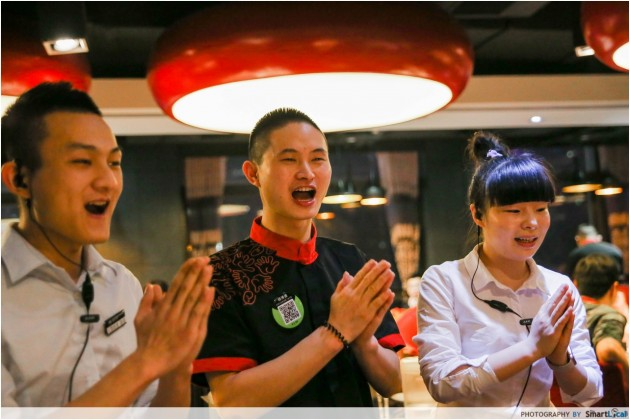
“Thank you” is universally recognised as a magical phrase which makes all the difference in courtesy levels, making it a must-know expression in any foreign language. In Cantonese, it’s expressed as “多谢” (do je).
Feel free to utilise this phrase to express gratitude for the assistance you’ve received while navigating a foreign country, or to show appreciation for the services provided when shopping or after having dined in a restaurant.
4. Excuse me
唔該 (mm goy)
If raising your hand in a restaurant isn’t garnering the attention you need, try vocalising the words “唔該” (mm goy).
Even if the service staff is already attentive to you, incorporating these words before making your request adds a touch of politeness. After all, going the extra mile in displaying courtesy never goes unnoticed.
Example: “唔該, 我想有呢個” (mm goy, ngo seung yau ni go)
Translated: “Excuse me, I would like to have this.”
5. Sorry
對唔住 (deui mm jyu)
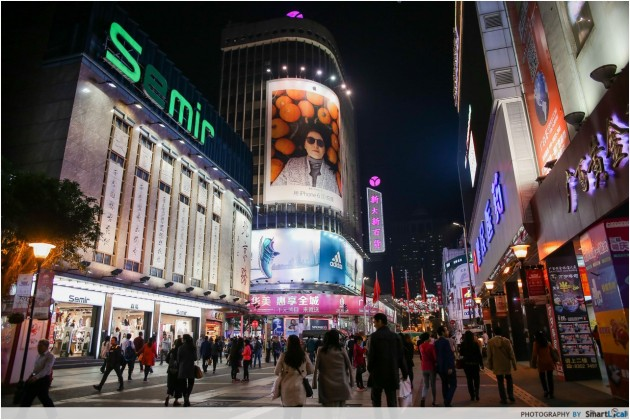
Areas in Hong Kong like Tsim Sha Tsui or Causeway Bay can get very crowded, especially during weekends. If you accidentally bump into someone, instead of staring blanking at them, you can say “對唔住” (deui mm jyu), which translates to “sorry”.
Similar to Mandarin, you don’t need to add the words “I am” before the said phrase. You can jump right into using it to express your apology.
6. Yes/no
係 (hai)/唔係 (mm hai)

“係” (hai) translates to yes, while “唔係” (mm hai) translates to no.
When you hear someone combining both terms – “係唔係” (hai mm hai) – it’s an informal way of asking a question. It’s like using the phrase “is it?” in Singlish, but with a Canto flair.
Example: “你係唔係新加坡人啊?” (nei hai mm hai san ga po yan a)
Translated: “You’re Singaporean, is it?”
7. I don’t understand
我唔明 (ngo mm ming)

If you give the impression that you’re fluent in the language just from a short conversation using the phrases mentioned above, it’ll come to a point where the other party starts asking you in-depth questions in Cantonese or speaking too quickly for you to comprehend.
In such situations, responding with “我唔明” (ngo mm ming) will convey that you don’t understand what they’re saying.
8. I don’t speak Cantonese
我唔會講廣東話 (ngo mm wui gong gwong dung wa)
For those who just can’t Canto, you can always cut into the conversation with “我唔會講廣東話” (ngo mm wui gong gwong dung wa).
If telling them “我唔明” (ngo mm ming) doesn’t effectively convey that you don’t understand the language, adding this line should make it crystal clear. Hopefully, with proper enunciation, Cantonese speakers should understand your message and refrain from trying to communicate with you in a language where you completely catch no ball.
9. Can you speak more slowly?
你可唔可以講得慢啲啊? (nei ho mm ho gong dat man di ye ah)

Image credit: Shutterstock
On the flipside, if you do possess some basic conversational Cantonese skills but can’t catch the fast speaking from locals, simply say “你可唔可以講得慢啲啊?” (nei ho mm ho gong dat man di ye ah) to get them to slow their roll.
With Hong Kong’s hurried pace of life, it comes as no surprise that their everyday speech can be delivered at speeds which are beyond a beginner’s grasp. To avoid any misheard messages or just question marks on your face, hit them with this so they can slow down and match your pace.
– Shopping –
10. How much is this?
呢几多钱 (ni gei do chin)

When shopping on the streets of Mong Kok, it can be challenging to determine prices, especially when there are limited signs indicating them. To avoid any misunderstandings or surprises, you can ask “呢几多钱” (ni gei do chin) to confirm the price tag you are committing to.
When using this phrase, do point to the item or hold it up so that the seller’s attention is drawn to the specific product you’re referring to.
11. Too expensive lah
太貴啦 (taai gwai la)
If you’ve picked up an item that exceeds your budget, you can comment “太貴啦” (taai gwai la) to express your surprise at the high price tag, and convey that you’d like to pass on the item.
This can serve as a subtle hint to the seller that you’re hesitant about making the purchase, or can even be an opportunity to initiate a bargaining conversation.
12. Cheaper lah
平啲啦 (peng di la)
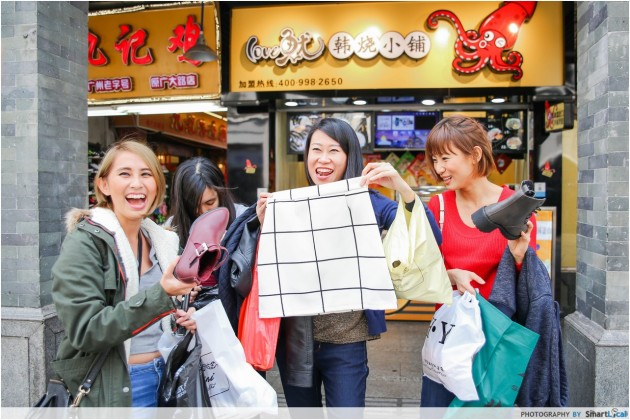
After commenting “太貴啦 (taai gwai la)” and if you’re confident about bargaining with the seller, you can always continue with “平啲啦” (peng di la) and see if they are willing to negotiate.
Same as in Singapore, adding the casual and light–hearted “la” can help create a friendly atmosphere during the conversation.
13. It’s all right
唔緊要 (mm gan yiu)
While bargaining, “唔緊要” (mm gan yiu) can be used to politely reject someone or decline their offer. For instance, when the staff offers you an alternative to a piece of apparel you’re looking for that has run out of size, you can use this phrase to indicate that it’s not necessary.
– Dining –
14. This/that
呢个 (ni go)/个个 (go go)
Imagine ordering your caifan in Cantonese by saying “呢个” and “个个”.
You can use “呢个” (ni go)/“个个” (go go) the same way as how you order cai fan at the coffee shop when you have no clue what the name of the dish is. Just make sure you point to what you want so that the waiter can catch your drift.
Example: “我要呢個.” (ngo you ni go)
Translated: “I want this.”
15. There’s no need
唔需要 (mm seui yiu)
When someone asks if you’d like to add a drink or some starters to your meal and you’re not interested, a simple response of “唔需要” (mm seui yiu) will do the trick. It’s a polite and straightforward way to decline the offer.
16. Bill, please
买单, 唔该 (mai dan, mm goy)
There are 2 main things on everyone’s mind when having a meal at any restaurant: what to order, and how much everything costs.
When you’re requesting for the bill after lunch or dinner, go straight to the point with “买单, 唔该” (mai dan, mm goy). The waiters will know that you’re ready to conclude your meal.
– Travelling –
17. How to get to ____?
点去 (dim heui)
If you find yourself lost and in need of directions, you can use the phrase “点去” (dim heui) after mentioning your intended destination to find the best way to get there.
To sound polite, add the words “請問” (ching man), which means “excuse me” before asking.
Example: “請問海洋公園点去?” (ching man hoi yeung gung yun dim heui)
Translated: “Excuse me, how to get to Ocean Park, please?”
18. Where is ____ ?
嗨边度 (hai bin dou)
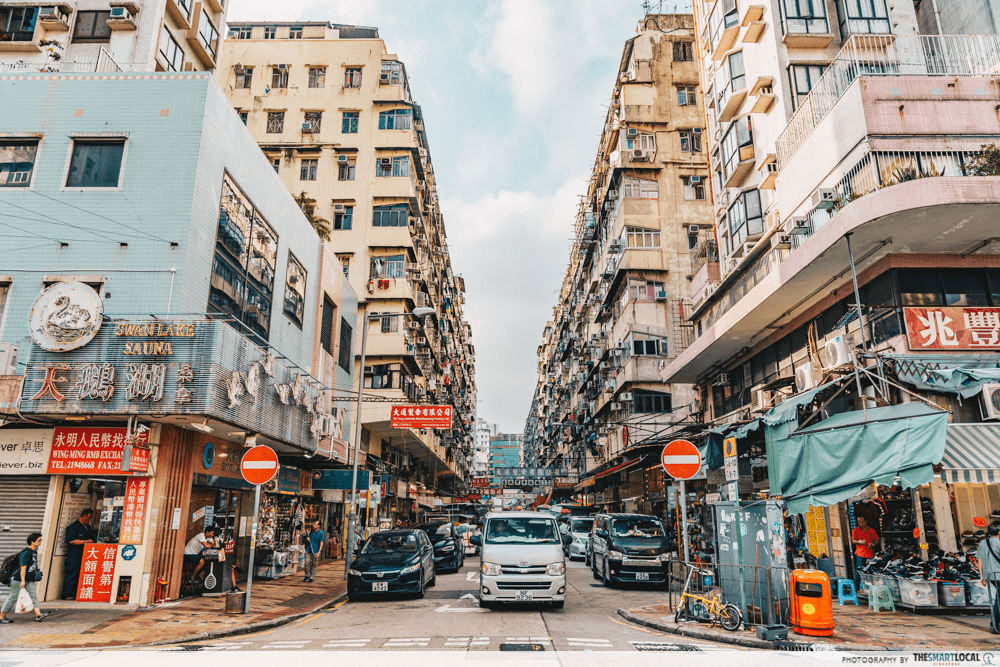
When technology lets you down and you find yourself in need of navigation assistance without your trusty Google Maps – or Baidu Maps in some cities – you can turn to the locals and ask for help using the phrase “嗨边度” (hai bin dou).
We’ve also put together a list of places you might need help finding when travelling:
- 厕所 (chi so) – Toilet
- 巴士站 (ba si jaam) – Bus stop
- 的士站 (dik si jaam) – Taxi stand
- 地铁站 (dei tit jaam) – Metro station
- 飛機場 (fei gei cheung) – Airport
- 旅館 (leui gun) – Hotel
Example: “厕所嗨边度?” (chi so hai bin dou)
Translated: “Where is the toilet?”
19. Please take me to _____
請帶我去 (cheng daai ngo heui)
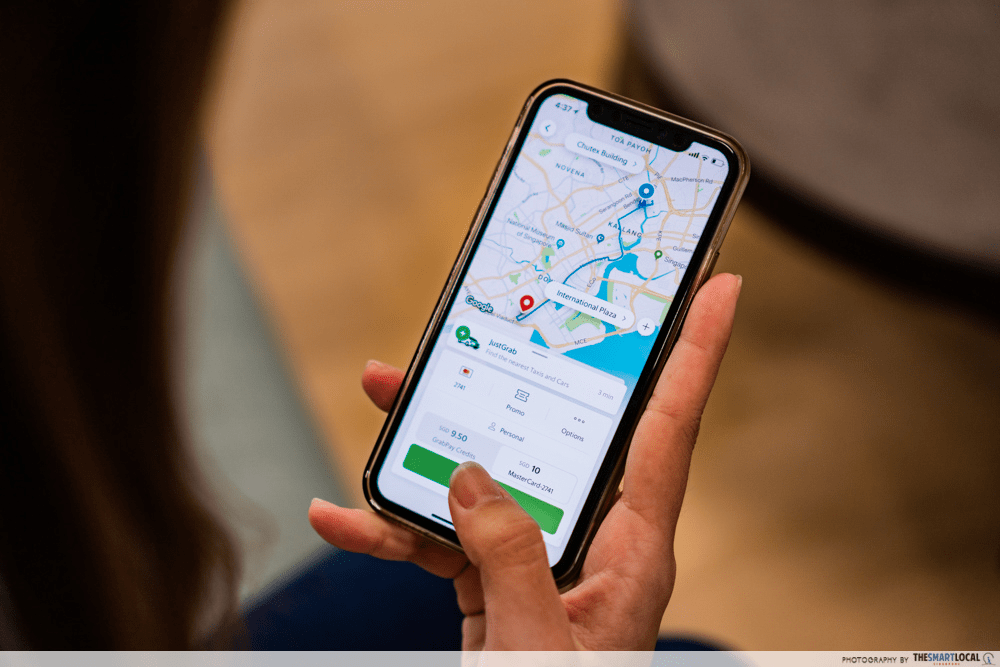
Unlike in Singapore, it’s actually easier to flag a cab in Hong Kong than it is to book a private hire ride through an app. For those who have hopped onto a taxi the old-fashion way, you can inform your driver of your desired destination by saying “請帶我去” (cheng daai ngo heui) before stating the location.
Example: “請帶我去飛機場.” (cheng daai ngo heui fei gei cheung)
Translated: “Please bring me to the airport.”
– Miscellaneous –
20. Can I smoke here?
呢度可以食煙啊 (ni do ho yi sek yin ah)
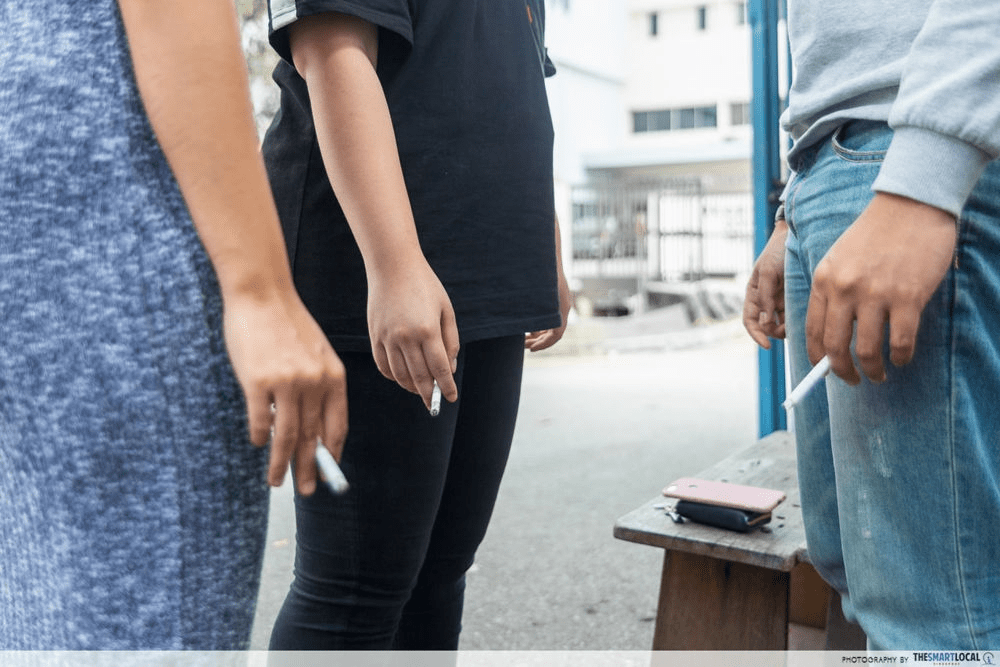
Folks who have been to Hong Kong or China are likely privy to the fact that they have a lot more public smoking areas than in Singapore. There are even indoor and air-conditioned eateries that are smoker-friendly. You can never be too sure though, so it won’t hurt to enquire with the staff by asking “我可以喺呢度食煙呀?” (ngo ho yi hai ni do sek yin ah) before you light up.
You can pose the same question if you’re trying to ascertain whether an establishment allows smoking, precisely because you wish to avoid it. This will prevent unpleasant surprises, and god forbid any escalations like the Singaporean and Hong Kong fight over cigarette smoke at an eatery.
Basic Cantonese phrases you should know
There you have it, the must-know Cantonese phrases that would be helpful for any travellers to Hong Kong, Macau, cities in mainland China like Guangzhou, and even areas in Malaysia like Ipoh.
With this handy list of Cantonese phrases and some practice, you’ll be well on your way to speaking like a pro by the time you book your next flight to those cities.
To help plan your next trip to Hong Kong:
- Hong Kong Disneyland guide
- Street art and photo spots in Hong Kong
- Family-friendly places in Hong Kong
- Free things to do in Hong Kong
Article originally published on 28th June 2023. Last updated by Renae Cheng on 28th June 2024.
